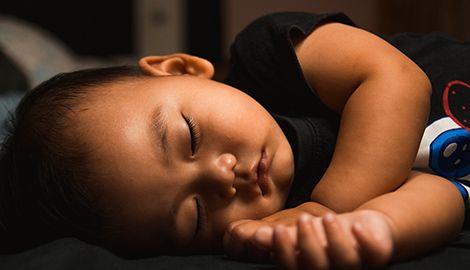
Sleep is an important part of children’s mental and physical development. For instance, children who get enough sleep typically have better memory and problem-solving skills and are less likely to be overweight. Well-rested children are also less likely to cry or throw tantrums due to fatigue, a benefit to any parent! Because their bodies are hard at work growing quickly the first five years, children need a lot of sleep, nearly double the eight hours recommended for adults. Children should sleep the following amount each day based on their age:
- Birth to 3 months: 14-17 hours
- 4 months to 1 year old: 12 to 16 hours
- 1 to 2 years old: 11 to 14 hours
- 3 to 5 years old: 10 to 13 hours
During the first few months, babies can take several (3 or more) naps during the day and usually only sleep a few hours at a time at night. Often, this is because they don’t know the difference between daytime and nighttime, and their stomachs are small, so they need to eat frequently. Don’t worry, they usually get more night sleep with each month that passes. For detailed information on babies’ sleep schedules the first year, see the resource below from What to Expect.
Sleep Routines
Parents and other caregivers can play an important role in helping children develop sleep routines. These things can help:
- Put children to sleep and wake them up at the same times each day, even on weekends.
- Keep them away from electronic devices like television or phones at least one hour before bedtime.
- Encourage physical activity during the day and calm activities before bedtime.
- Have a bedtime routine, such as taking a warm bath, brushing teeth, and reading a story.
- Keep their bedrooms quiet and dark as much as possible.
- If your child shares a bedroom with others, be mindful of how others’ sleep routines or bedtimes might affect the child’s sleep.
When teaching children to fall and stay asleep, parents might want to set limits and stick to them. One way is to have rules about why children can leave their bedrooms at night (to drink water, for instance). Parents can also be strict about stopping bedtime activities at the same time each night so that children do not stay up late. Your child might be having trouble adjusting to a routine or getting enough sleep if they:
- Have become more irritable or moody than usual
- Have problems concentrating or making decisions
- Fall asleep during the day (outside of nap time)
- Sleep in past wake time on the weekends
- Wake up several times during the night
- Toss and turn often in bed
Most children have problems adjusting to new sleep routines, so it’s normal to see these patterns in your child. If they do not improve, and you’ve tried different ways of helping your child sleep, talk with your child’s doctor or nurse. They might recommend other approaches you can try.
Safe Sleep
When children, especially babies, are put down for naps or nighttime sleep, it is important that their sleep position and space are safe. It is recommended that babies sleep on their backs and in a bassinet or crib without any toys or loose blankets. This can help prevent suffocation or accidents that can happen when babies sleep on their side or stomachs, or when they are surrounded by items that can cover their noses and mouths. Also, look for small or sharp objects that children can grab or put in their mouths. For more recommendations on creating safe sleep environments, see the resource below from the Centers for Disease Control and Prevention (CDC).
Helpful Resources
Getting Baby on a Sleep Schedule (What to Expect): This website offers detailed information, including a print-friendly chart, that parents can use to better understand the recommended sleep schedule for babies up to 1 year old. It also includes links to detailed sample sleep schedules by month. Helping Babies Sleep Safely (CDC): This website lists the different ways that parents and caregivers can create a safer sleeping environment for babies. It also offers links to related resources by the American Academy of Pediatrics.
